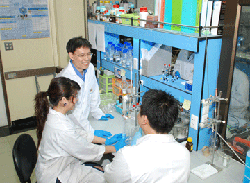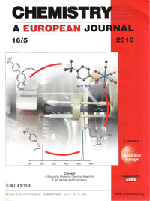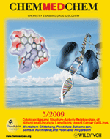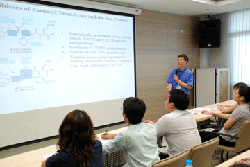The First Ever Organic Chemistry Article from Thailand in Chemistry, A European Journal
CGI Faculty Members Successfully Devised a Synthetic Route for the Potential Anticancer Agents
Development of Human Resources
Research on Organic Chemistry
The Chemistry, A European Journal serves as a forum for the rapid scientific dissemination of outstanding research work in all aspects of chemistry and related fields. Established 15 years ago, the journal has continuously improved as indicated by the increasing impact factors over the years (5.454 in 2008) and has its rank among the top five of the primary chemical literatures.

 |
The research work accepted for publication in the Chemistry, A European Journal features the use of immobilized acid on silica to affect some chemical steps in a more efficient and environmentally benign way due to much simpler experimental techniques, mild reaction conditions, and high selectivity of the product over other by-products. More importantly, the product flavanoids of the described chemistry are structurally related to those reportedly exhibiting their potential use as new designed drug candidates for some cancers primarily because of their selective interactions with estrogen receptor β, which has been implicated in some forms of breast cancer. In addition, the chemistry reported in the article is very challenging because it has not been studied or performed before, thus, making an impact on and contributing critically to the existing knowledge pivotal to the advancement of organic chemistry not only nationally but also globally.
It is noteworthy that the milestone achieved here is only in the third full year of CGI, exemplifying the high quality of the faculty members who are jointly appointed at CRI as research staffs. It should be emphasized that one important aspect of this landmark publication in the Chemistry, A European Journal is the completion of the entire work only in Thailand.
In addition to the abovementioned publication in the Chemistry, A European Journal, a research article from the same group was published in ChemMedChem, in 2009, on the structure-activity relationships of the potential anticancer drug candidates in the lamellarin family. Because of the highly favorable reviews from the referees, the article was highlighted on the frontispiece (inside cover) of the issue publishing the article.
 |
The research work has been supported financially by the Chulabhorn Research Institute, the Center of Excellence on Environmental Health, Toxicology and Management of Chemicals (ETM), Chulabhorn Graduate Institute, and the Thailand Research Fund (TRF).
For more information and detail, please direct your correspondences to Dr. Poonsakdi Ploypradith, the principal investigator of the research project and the corresponding author of these articles, at the Program in Chemical Biology, Chulabhorn Graduate Institute or Laboratory of Medicinal Chemistry, Chulabhorn Research Institute (daytime telephone number: 02 5740622 ext 1411 or e-mail: [email protected]).
Announced on 23 February 2010.


